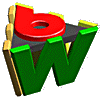

Object-Oriented Web Servers and Data Modeling Workshop |
The main objective of this workshop is to bring together researchers and developers working on designing extensible object frameworks for the World-Wide Web -- as exemplified by the new generation of HTTP servers ( Jigsaw, Java Web Server, etc.) -- and those interested in utilizing these frameworks to apply data-modeling approach to Web site construction. The desired result of the workshop is the formation of an informal working group from workshop participants.
With the expansion of the World-Wide Web, there has been a tremendous growth in the redundancy of data. It is very often the case that a new Web site is created by copying, rearranging and reformatting information from other sites in order to satisfy some specialized search and presentation requirements. The result is a large waste of human resources and Internet bandwidth, as well as a maintenance nightmare. Some of the most promising solutions to this problem have involved applying a data-modeling approach to designing and building Web sites. In such an approach, the Web site does not necessarily contain the data per se, but instead contains metadata entities that facilitate access to the desired data.
In parallel with this work, the proliferation of Java has served as a catalyst for a number of efforts toward designing and implementing new object-oriented, extensible Web servers, the most advanced and ambitious to date being Jigsaw [bai96], from W3C.
We see in these two trends -- the data-modeling approach and the emergence of object-oriented Web servers -- the potential for a great deal of synergy. For the past several months, we have been developing MetaMagicTM [shk97], a Web server extension that makes use of server-side Java support to build "virtual Web sites" composed of automatically-generated metadata objects. These objects are made accessible via the Web server. When accessed, they utilize their metadata attributes to obtain the associated data from wherever it is actually located and present it via HTTP, in a form suitable for a Web browser. This approach allows us to impose logical Web views on existing heterogeneous data. It also allows people building Web sites to separate content from presentation, a useful goal, considering that there may be any number of ways to present the same content. Additionally, MetaMagic is capable of utilizing existing indexing technologies to facilitate efficient searching over the content represented by these metadata repositories. Currently, MetaMagic relies on object-oriented features exclusive to Jigsaw, but it is our intention to adapt it to work with other servers as well.
MetaMagic is by no means the only attempt to apply a data-modeling approach to constructing Web sites. The "CorbaWeb" work [mer96] shares some of its goals and objectives with MetaMagic but provides a different solution, based on using CGI gateways to provide access to CORBA objects in a Shared Information Space (SIS). "InfoHarness" is another example of the use of data modeling for building Web sites [shk95-1]. This earlier work was targeted primarily at providing Web access to legacy information, and like CorbaWeb, made heavy use of the CGI mechanism.
Just as MetaMagic is not the only project to adopt a data-modeling approach to Web site construction, neither is Jigsaw the only effort to apply Java technology to the development of a new generation of extensible Web servers. Other efforts include:
The main objective of this workshop is to bring together researchers and developers working on designing extensible object frameworks for the World-Wide Web -- as exemplified by these new Java-based HTTP servers -- and those interested in utilizing these frameworks to apply data-modeling approach to Web site construction. The desired result of the workshop is the formation of an informal working group from workshop participants.